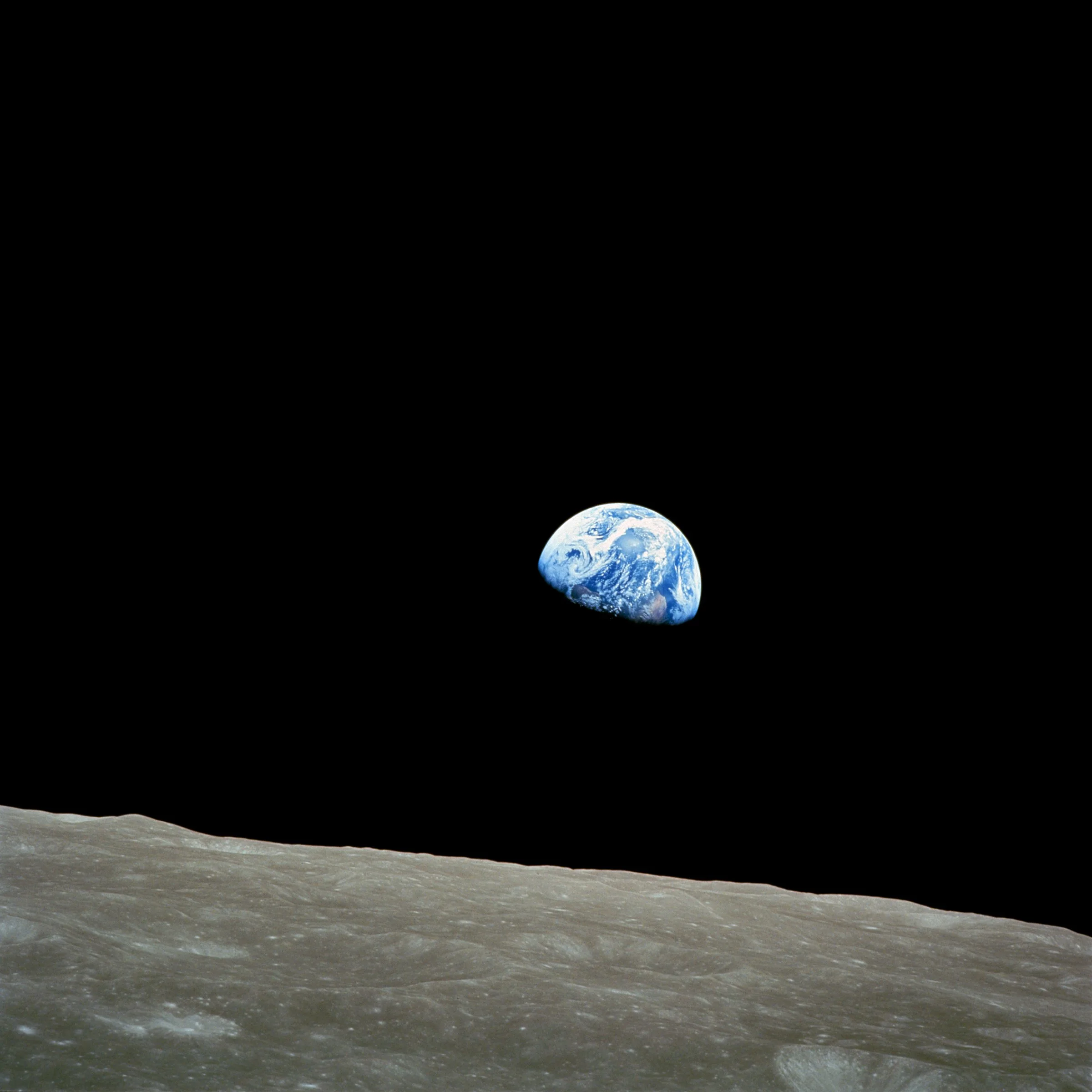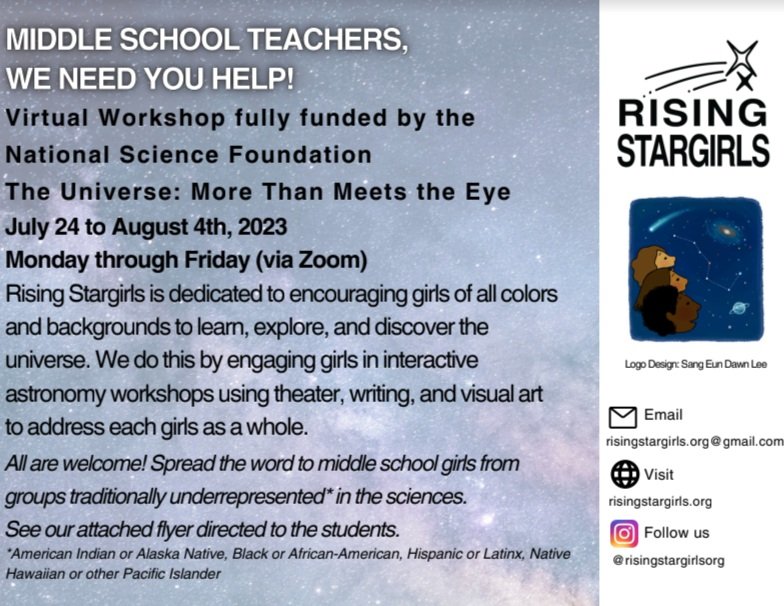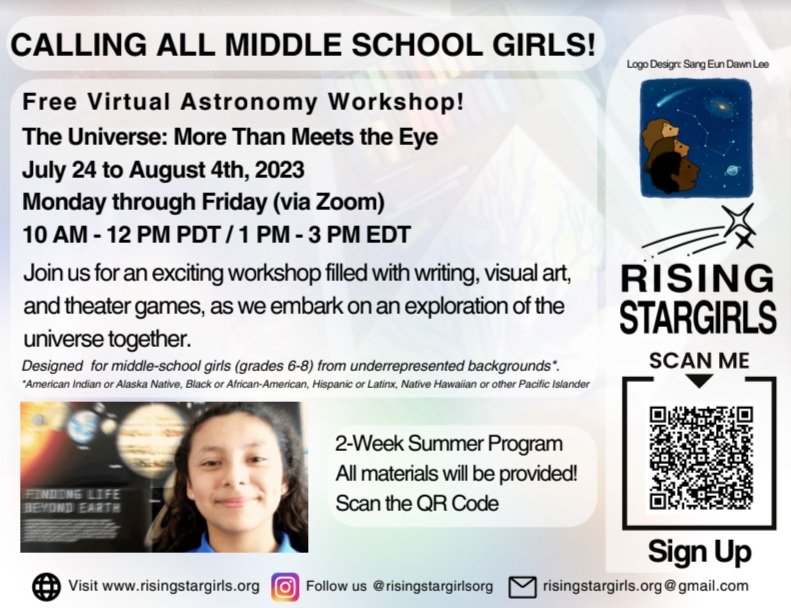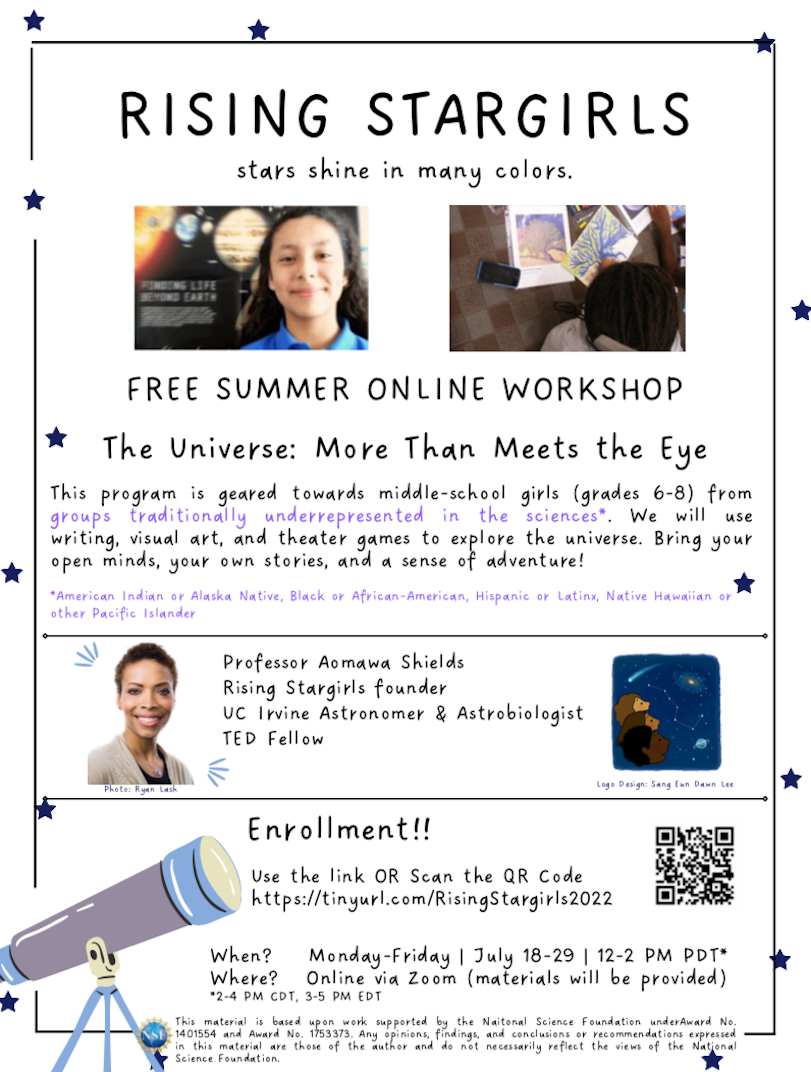2024 Summer Virtual Astronomy Opportunity for Middle-School Girls!
Virtual Astronomy Opportunity for Middle-School Girls! Summer 2023
Astronomy Workshop Training for Educators
Virtual Astronomy Opportunity for Middle-School Girls! (Spanish-Translated)
Virtual Astronomy Opportunity for Middle-School Girls!
UCI Professor Aomawa Shields Featured in UCI Physical Sciences Communications Article
UCI Professor Aomawa Shields is featured in “UCI’s Rising Stargirls Program Dawns Again This Summer”, an article by Lucas Van Wyk Joel of UCI Physical Sciences Communications which discusses her program, Rising Stargirls.
The Rising Stargirls Handbook en Español is now available!
The Rising Stargirls Handbook en Español is here! This is the Spanish translated version of the original Rising Stargirls Teaching and Activity Handbook.
This translation was provided by Nina Robbins Blanch (our many thanks to her!), who was born and raised in Barcelona, Spain. She completed her undergraduate studies in Astrophysics and Earth Science at the University of California, Santa Cruz, where she focused on planetary science. Her main research work consisted in modeling atmospheres of hot Jupiter exoplanets through an internship at NASA Jet Propulsion Laboratory. During her time at UC Santa Cruz, she was a member of WiPA (Women in Physics and Astrophysics), where she helped organize science outreach events to encourage middle school students (especially girls) to pursue careers in physics and astronomy. Currently, she is a graduate student pursuing an M.Sc. in Ocean and Climate Physics at the University of Hamburg, Germany, where she hopes to study the role of atmospheric processes, such as cloud formation, in shaping Earth's current and future climate.
Download it for free and use it in your virtual classrooms and informal learning environments anywhere in the world!
Sincerely,
Rising Stargirls Team
"Universe: More Than Meets the Eye" Educator Webinar by Maya Silverman
Are you interested in supporting middle-school girls’ dreams of becoming scientists? Do you want to incorporate inclusive and engaging science lesions into your curriculum? Rising Stargirls (RS) works with formal and informal educators to provide resources to make a difference.
RS is an educational organization with the mission of encouraging girls to learn, explore, and discover the universe. Geared towards middle-school girls (grades 6-8) from groups traditionally underrepresented in the sciences, we engage girls of all colors and backgrounds in interactive astronomy workshops using theater, writing, and visual art to address each girl as a whole. With our five years of experience working with girls across the US, we have created a training webinar for educators across the world!
As part of our current National Science Foundation (NSF) CAREER Award, we embraced the goal of bringing RS to a global platform. Encouraging educators from around the world to incorporate RS activities into their curriculums is a big part of that goal. We held our most recent Educator Webinar on July 29th, 2021 after running our first ever online RS Workshop for girls across the US (link blog post for the Workshop). The goal of this webinar was not only to train participants on RS activities, but also to give them an idea of what an online workshop can look like.
Imagine that you are going to facilitate your own workshop. How does that feel for you? How are you preparing for the workshop? Who is on your team? RS has published an activity handbook in English and Spanish filled with more than 10 days worth of activities that engage students in learning about astronomy and creating art, as well as an activity handbook adapted for an online setting. Two other resources for lesson planning that were discussed in the Educator Webinar are the Underrepresentation Curriculum Project (URC) and APS STEP UP. Here you can find lesson plans on representation, stereotype threat, systemic racism, physicists and careers in physics, and so much more. Recently, the URC has released a note to instructors about “Anti-Critical Race Theory” bills and how to continue incorporating URC lessons into their curriculum.
Given the technology to hold educational workshops fully online, it is important to consider how you can adapt to create the largest impact for your community. Do you have the physical space to hold a workshop? Would you rather serve your local community or work with girls from all over the world? Does your target audience have access to resources necessary for an online workshop? Do you have technical support? To make sure that all of the girls could fully participate in our online RS Astronomy Workshop, we assembled and mailed art boxes, funded by NSF. These contained pastels, markers, pencils, magazine pages for collaging, glue, snacks, a mirror with “This is what a scientist looks like” written on it, and more!
During the webinar, we went through an example RS activity about constellations and constellation stories. We discussed questions like: Which constellations do you know? Are all stars in one constellation the same distance from earth? What makes stars shine? And we discussed the importance of encouraging girls' thought processes while answering these questions rather than praising the correct answers.
The RS team is so grateful that we had the opportunity to connect with educators leading positive impact initiatives across the country. We look forward to collaborating with you and we hope you will keep in contact with us about how you are using RS activities and what results you are seeing. If you were not able to attend past Educator Webinars, please sign up for our mailing list to receive notifications when we plan our next one.
This material is based upon work supported by the National Science Foundation under Award No. 1753373.
Summer 2021 "The Universe: More Than Meets the Eye" Workshop Recap by Maya Silverman
A flier was distributed in two languages, 40 art boxes were mailed, a Spotify playlist was created, and my real life Zoom background collage was complete. It was time to launch our very first online Rising Stargirls Astronomy workshop!
Rising Stargirls sits at the intersection of science and art, providing an avenue for individual self-expression and personal exploration, interwoven with scientific engagement and discovery. We offer middle-school girls (grades 6-8) from groups traditionally underrepresented in the sciences (American Indian or Alaska Native, Black/African-American, Hispanic or Latinx, Native Hawaiian or other Pacific Islander) an opportunity to develop their identities as scientists using theater, writing, and visual art. The program has been operating successfully for over five years, but the COVID-19 pandemic brought new opportunities and new challenges. A big challenge was figuring out how to move an in-person program to Zoom. That journey began on June 14th.
Moving online gave us the chance to reach more girls from all over the US. Past workshops had been capped at 15 participants, but this summer, we were able to work with over 40 girls from four different states. “What’s the weather like where you live?” and, “What time is it for you?” were the most common conversation starters between participants. However, hosting a Zoom meeting with 40 middle-school students brings the challenge of creating a safe and intimate environment that encourages the girls to share their full selves. We started with a set of ground rules:
Know yourself: balance your listening and your talking
Speak honestly. All perspectives are valid, and all perspectives are partial.
Take risks and make mistakes.
Your intentions may not be the same as your impact. Own your impact.
We must make sure everyone feels safe.
We are all in this together.
Be creative.
Our Technical Assistant, Jessica Howard, ensured that each participant had the technical resources to participate fully in our workshop, and kept our Zoom room safe from unwanted visitors.
We opened every session with a small group activity to create connections outside of art and science. Whether it was sharing facts about a random object within reach, or inventing new words, the girls had the opportunity to learn something new about their peers. This, along with debriefs and show-and-tells, helped the girls become comfortable with each other. We knew it was working when girls exchanged contact information and shared book recommendations!
In addition to art and science activities, we facilitated discussions about astronomy and physics, focusing on the importance of representation and highlighting women of color (WOC) in these fields. The girls shared that learning about scientists who look like them or come from a similar background as them helps them feel like they belong and can succeed in the field. To encourage girls to find role models that they can relate to, they researched a WOC astronomer or physicist. One girl chose to research our very own Founder and Director, Dr. Aomawa Shields!
The outcomes from this workshop were stellar! Words can't describe how detailed and vibrant the art pieces were:
We got to see “a very hot Exoplanet surface! And it is orbiting so close to its parent star that it is tidally locked meaning one side is stuck facing the star and the other side is stuck facing the dark!”
We heard public service announcements on why NASA should fund their journey to Saturn’s moon, Titan, in search for life.
We created mnemonic devices to remember the order of the planets in our Solar System.
These art projects, and many others, were possible because our Administrative Assistant, Christina Dinh, assembled and mailed art boxes filled with all the necessary materials to the girls: pastels, markers, colored pencils, and even a mirror with “This is what a scientist looks like” written on it.
To assess how participants' identities as scientists changed over the two-week workshop, we asked several questions at the beginning and end of the workshop. Among them, we asked the girls to rate on a scale of 1 (disagree) to 6 (agree) their level of agreement with the statements, “I see myself as a science person.” and, “I talk to my friends and family about science.” We found that girls agreed with both of these statements more after the workshop, indicating their move toward positively developing their identities as scientists.
Overall, the workshop was a huge success and we have new friends, drawings, poems, collages, playlists, and memories to show for it.
This material is based upon work supported by the National Science Foundation under Award No. 1753373.














